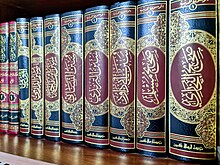
Abū Zakariyyā Yaḥyā ibn Sharaf al-Nawawī (Arabic: أبو زكريا يحيى بن شرف النووي;, popularly known as al-Nawawī or Imam Nawawī, was a Sunni Shafi'ite jurist and hadith scholar. Al-Nawawi died at the relatively early age of 45. Despite this, he authored numerous and lengthy works ranging from hadith, to theology, biography, and jurisprudence that are still read to this day.

Abu Hanifa was a Sunni Muslim scholar, jurist, theologian, ascetic, and eponym of the Hanafi school of Islamic jurisprudence, which remains the most widely practiced to this day. His school predominates in Central Asia, Afghanistan, Iran, Turkey, the Balkans, Russia, Circassia, Pakistan, Bangladesh, India, and some parts of the Arab world.
Abu Abd Allah Muhammad ibn Umar ibn Waqid al-Aslami was a historian commonly referred to as al-Waqidi. His surname is derived from his grandfather's name Waqid, and thus he became famous as al-Imam al-Waqidi. Al-Waqidi was an early Muslim historian and biographer of the Islamic prophet Muhammad, specializing in his military campaigns. He served as a judge (qadi) for the Abbasid caliph al-Ma'mun. Several of al-Waqidi's works are known through his scribe and student, Ibn Sa'd.
Abū al-Ḥusayn ‘Asākir ad-Dīn Muslim ibn al-Ḥajjāj ibn Muslim ibn Ward ibn Kawshādh al-Qushayrī an-Naysābūrī or Muslim Nayshāpūrī, commonly known as Imam Muslim, was an Islamic scholar from the city of Nishapur, particularly known as a muhaddith. His hadith collection, known as Sahih Muslim, is one of the six major hadith collections in Sunni Islam and is regarded as one of the two most authentic (sahih) collections, alongside Sahih al-Bukhari.
Māriyya bint Shamʿūn, better known as Māriyyah al-Qibṭiyyah or al-Qubṭiyya, or Maria the Copt, died 637, was an Egyptian woman who, along with her sister Sirin bint Shamun, was given to the Islamic prophet Muhammad in 628 by Al-Muqawqis, a Christian governor of Alexandria, during the territory's Sasanian occupation. She spent the rest of her life in Medina and had a son, Ibrahim with Muhammad. The son died as an infant and she died almost five years later.
Atiyah ibn Sa'd ibn Junādah al‐'Awfi [died 729] was an early Muslim scholar of Islam. He is regarded as a reliable narrator of hadith. An aged supporter of rebels and a Shia notable of the time, a disciple of the companion of Muhammad Jabir ibn Abd Allah al-Ansari and a famous narrator of Hadith, Atiyya ibn Sa'd Awfi was arrested by Muhammad bin Qasim on the orders of Al-Hajjaj and demanded that he curse Ali on the threat of punishment. Atiyya refused to curse Ali and was punished. While Maclean doesn't give the details of the punishment, early historians like Ibn Hajar Al-asqalani and Tabari record that he was flogged by 400 lashes and his head and beard shaved for humiliation and that he fled to Khurasan and returned to Iraq after the ruler had been changed.

Sahih al-Bukhari is a hadith collection and a book of sunnah compiled by the Persian scholar Muhammad al-Bukhari (810–870) around 846. The author was born in Bukhara in today's Uzbekistan. Sahih (صحيح) means "authentic".
Shams ad-Dīn adh-Dhahabī, also known as Shams ad-Dīn Abū ʿAbdillāh Muḥammad ibn Aḥmad ibn ʿUthmān ibn Qāymāẓ ibn ʿAbdillāh at-Turkumānī al-Fāriqī ad-Dimashqī was an Athari theologian, Islamic historian and Hadith scholar.
The historiography of early Islam is the secular scholarly literature on the early history of Islam during the 7th century, from Muhammad's first purported revelations in 610 until the disintegration of the Rashidun Caliphate in 661, and arguably throughout the 8th century and the duration of the Umayyad Caliphate, terminating in the incipient Islamic Golden Age around the beginning of the 9th century.
Abū ʿAbd Allāh Muḥammad ibn Yazīd Ibn Mājah al-Rabʿī al-Qazwīnī (Arabic: ابو عبد الله محمد بن يزيد بن ماجه الربعي القزويني; commonly known as Ibn Mājah, was a medieval scholar of hadith of Persian origin. He compiled the last of Sunni Islam's six canonical hadith collections, Sunan Ibn Mājah.

Dhia' ul-Dīn 'Abd al-Malik ibn Yūsuf al-Juwaynī al-Shafi'ī was a Persian Sunni scholar famous for being the foremost leading jurisconsult, legal theoretician and Islamic theologian of his time. His name is commonly abbreviated as al-Juwayni; he is also commonly referred to as Imam al-Haramayn meaning "leading master of the two holy cities", that is, Mecca and Medina. He acquired the status of a mujtahid in the field of fiqh and usul al-fiqh. Highly celebrated as one of the most important and influential thinkers in the Shafi'i school of orthodox Sunni jurisprudence, he was considered as the virtual second founder of the Shafi'i school, after its first founder Imam al-Shafi'i. He was also considered a major figurehead within the Ash'ari school of theology where he was ranked equal to the founder, Imam al-Ash'ari. He was given the honorific titles of Shaykh of Islam, The Glory of Islam, The Absolute Imam of all Imams.
Abd al-Malik ibn Abd al-Aziz ibn Jurayj was an eighth-century faqīh, exegete and hadith transmitter from the Taba' at-Tabi'in.

Abū Bakr Aḥmad ibn Ḥusayn ibn ʿAlī ibn Mūsā al-Khusrawjirdī al-Bayhaqī, also known as Imām al-Bayhaqī, was a Sunni scholar widely known for being the foremost leading hadith master in his age, leading authority in the Shafi'i school, leading authority on the foundation of doctrine, meticulous, a devoted ascetic and one of the notable defenders of the Ash'ari school. Al-Dhahabi said: "Unequalled in his age, unrivalled amongst his peers, and the Ḥāfiẓ of his time."
Abū Muḥammad Sufyān ibn ʽUyaynah ibn Maymūn al-Hilālī al-Kūfī was a prominent eighth-century Islamic religious scholar from Mecca. He was from the third generation of Islam referred to as the Tabi' al-Tabi'in, "the followers of the followers". He specialized in the field of hadith and Quran exegesis and was described by al-Dhahabi as Shaykh al-Islam—a preeminent Islamic authority. Some of his students achieved much renown in their own right, establishing schools of thought that have survived until the present.
Abu Nuʿaym al-Isfahani was a medieval Persian Shafi'i scholar and one of the leading hadith scholars of his time. His family was an offshoot of the aristocratic House of Mihran.
Abu al-Fadl Muhammad bin Tahir bin Ali bin Ahmad al-Shaibani al-Maqdisi, commonly known as Ibn Tahir of Caesarea, was a Muslim historian and traditionist. He is largely credited with being the first to delineate and define the six canonical works of Sunni Islam after the Qur'an, and the first person to include Sunan ibn Majah as a canonical work.

Sahifah of al-Ridha, also known as Sahifat of al-Reza and Sahifatal-Imam al-Ridha, is a collection of 240 hadiths attributed to Ali ibn Musa al-Ridha, the eighth Shia Imam.
Abū ʿAbdullāh Muḥammad bin Isḥāq Ibn Manda was an eminent Isfahani Sunni Hadith scholar of Persian origin.
al-Anṣārī, Abū l-Qāsim Salmān b. Nāṣir b. 'Imrān al-Arghiyānī al-Nīsābūrī al-Ṣūfī al-Shāfi'ī, commonly known as Abu al-Qasim al-Ansari was a Persian Sunni scholar known for being an Ash'arite theologian, Shafi'i jurist, traditionist, scriptural exegete and mystic during the Islamic Golden Age. He was the famous pupil of Imam al-Haramayn al-Juwayni and greatly influenced by him, as can be seen by his own theological writings. He was referred to as Sayf al-Nazr.
Al-Juwayni, `Abd Allah ibn Yusuf ibn `Abd Allah ibn Yusuf ibn Muhammad ibn Hayyuya, Rukn al-Din Abu Muhammad al-Ta'i al-Sinbisi al-Naysaburi al-Shafi`i al-Ash`ari, also known as Abu Muhammad al-Juwayni, was a Sunni scholar based in Khorasan. He was a leading jurist (faqih), legal theoretician (usuli), Arabic grammarian, (nahwi), Qu'ran exegete (mufassir) and a scholar of theology, man of letters, and hadith. He was the father of the great Imam al-Haramayn al-Juwayni.






